Becoming a Biomedical Technician as a 30 something woman
Nicole Ruffin is a Biomedical Equipment Technician/Clinical Engineer (Biomed) at Chester County Hospital/Penn Medicine.
Nicole is based in Pennsylvania in the USA.
In this article she shares her experience starting out in Healthcare Technology Management – HTM in her mid-thirties.
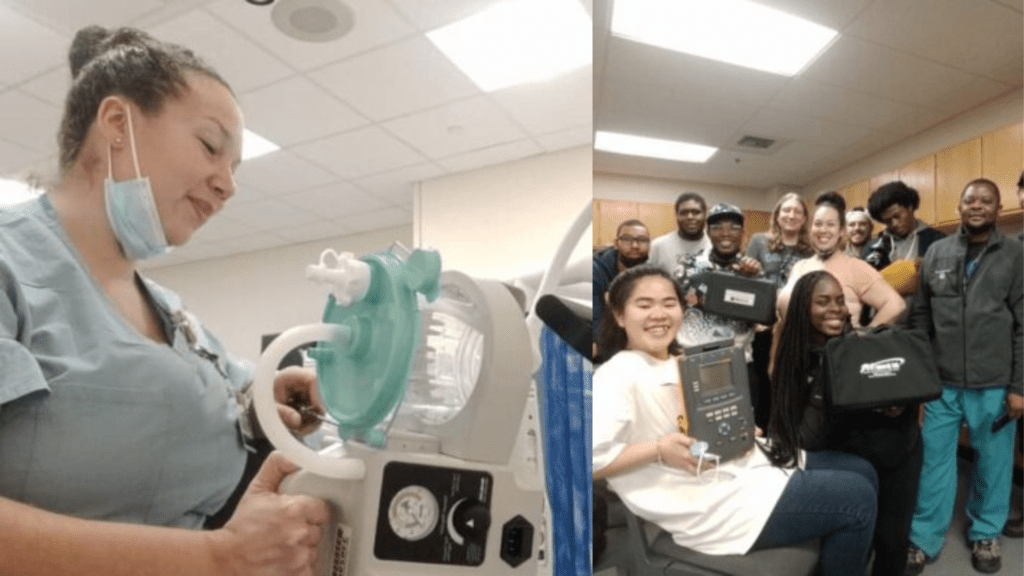

Background and path to working as a Biomedical Technician (Biomed)
Could you give a brief description of your background and what led you to study and work in biomedical engineering?
I come from a corporate background of personal banking and health insurance. As well, I was a small business owner as a ride share driver for almost five years.
I have always wanted to work in the healthcare field, but I only saw nursing as an option. Once I learned about the various specialties in the HTM (Healthcare Technology Management) field, I jumped at the opportunity to return to college and studying at the age of 36.
Were you interested in how things worked when you were a child?
I have always been interested in problem solving and troubleshooting. I learn best using my hands and enjoyed watching public television shows like Mr. Rogers and Sesame Street. Then later as an adult, shows like How It’s Made.
Was there anyone in your family who guided you towards working in healthcare?
My sister paved the way as the first family member to work in healthcare as a Medical Assistant. I was motivated to follow in her footsteps once I learned of an area of healthcare that I was interested in.
Has there been a particular person who has inspired you to work as a Biomedical Technician?
My late mother inspired me because she also returned to college and studying at the age of 36. In part, going back to studying is a tribute to her.
Volunteering
You volunteer for a number of organisations. How do you balance this with working?
I am sure to make serving my community a priority by interweaving service into my everyday life. Over time, it just becomes second nature, and it balances with my working career seamlessly.
What are the skills you take from volunteering into your work as a Biomed?
Humility, selflessness, patience, and advocacy are practices that I find make my work as a Biomed truly effortless, in many ways.
Most challenging part of the job as a Biomedical Technician (Biomed)
What do you find most challenging when you are working – technical side or people?
What I find most challenging when working is the technical side, as far as knowing when to pause on a project and come back to it. I sometimes get tunnel vision and want to finish a task the same day I start. I have had to learn that multiple projects can be ongoing for weeks and even months, simultaneously. Added to that is the fact that technology is complex. Projects can take time and that is ok!
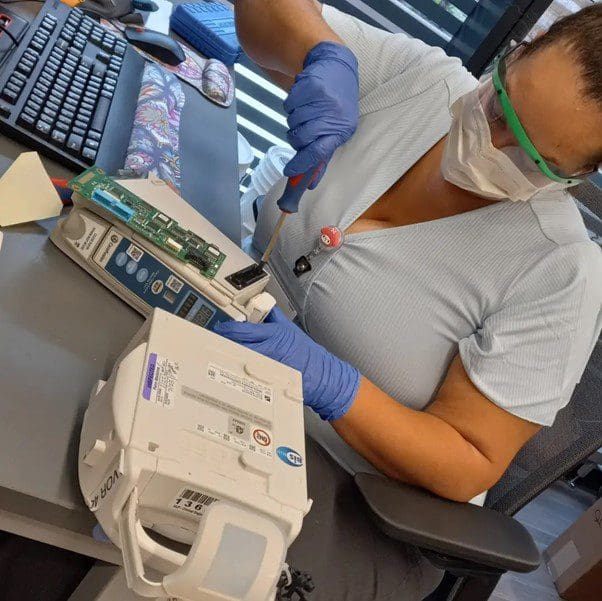

What has been your most challenging job in the field?
I got to service an older model Giraffe Omni Bed, that over time had changed hands amongst manufacturers. It was fun to learn by taking the bed apart, multiple times, and repairing a fan motor. Then finishing up the project by completing the preventative maintenance. What made it challenging was ordering parts and identifying the changes made by the multiple manufacturers that had acquired ownership of the device. Navigating through the changes has definitely taught me more patience.
Have you ever arrived on site and found that it was much easier than you expected? For example, did you ever need to simply switch on a machine.
All the time! Often we can resolve issues by simply clearing a blocked filter on a vitals monitor; or reseating cables to reset the function of an accessory. Rebooting devices by turning them off and on again has resolved many issues that seemed complicated in the critical patient monitoring environment, as well.
Is your role as a Biomedical Technician ever uncomfortable because of heat, cramped spaces, bad lighting, noise etc?
No, in fact I find that sometimes working in a smaller space allows easier collaboration with my clinical engineering comrades.
Working in a busy environment
How do you manage working and concentrating when there are other people around (possibly asking you questions or when you will be finished)?
This is a skill that I have certainly cultivated over time. I cannot say there is a specific way to manage and concentrate in an environment of others around asking questions. For me, it is a skill I have had to learn over my 20+ year career. Learning how to set boundaries, knowing how to prioritise, and having excellent time management skills, help tremendously.
Typical day as a Biomedical Technician
What’s your typical day like?
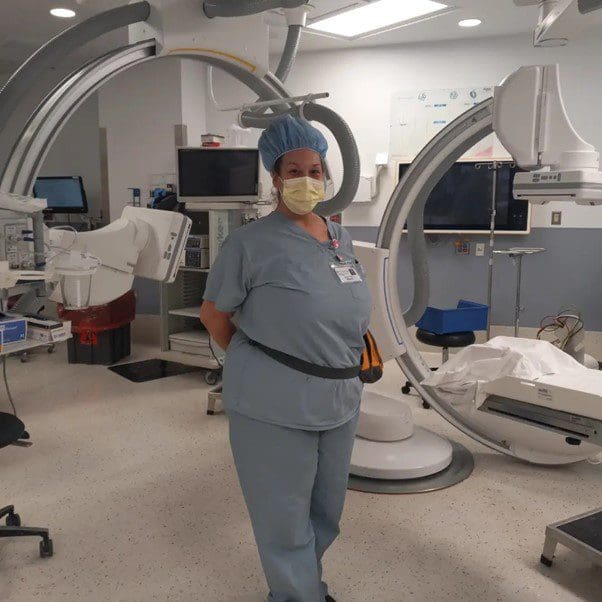

My day starts with an energetic drive into work, usually listening to music I can sing to. It puts me in a positive mood and sets my day up for high productivity.
When I enter the facility, I am sure to provide service to clinical staff and collect devices on my way to the shop. I prioritise my day with performing preventative maintenance, reviewing most current service manuals, and using location technology, utilising Excel spreadsheets, to quickly access devices.
Then, I am usually able to address corrective work calls as they come in on the same day; as well as addressing them on the unit, while communicating with the end users.
I end each day by commuting an hour to class, as I am still studying. If not, with studying and completing course work.
Busy, busy, busy!
My days fly by.
How much of your time do you spend working with equipment and how much with admin and other tasks?
I spend most of my day working with the equipment, either hands on or studying the service manuals for each device. Then I spend a smaller amount of the day on administrative tasks, requesting purchase orders, completing forms for vendor repairs, etc. I am occasionally assigned projects such as replacing or clearing external filters on patient monitors by unit.
Support and training
Which other parts of the organisation give you support?
During new hire orientation my organisation encouraged me to seek a mentor. It was a great decision to follow this advice. I have a mentor within my organisation now who supports me, she is great!
How much training do you take part in?
Each day I am training as a new BMET. I get to take part in an official training soon with AAMI and I am very excited for that.
Troubleshooting as a Biomedical Technician
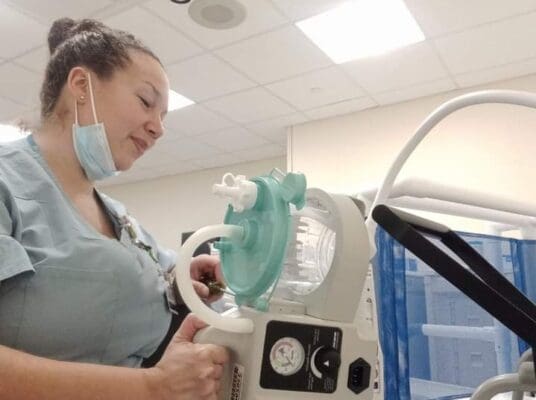

What is your procedure for servicing a piece of equipment?
When servicing a device, I have learned to review its maintenance history. While aligning each assessment with studying the original equipment manufacturer service manual. I reach out to my team for help, including making a call to technical support for assistance when needed.
Documentation I find to be a beneficial tool, also taking photos of devices prior to dismantling them in order to reassemble them correctly later.
Another key thing is noting clinical staff’s names during service calls to show care in how customer service is provided, and to follow-up during ongoing work assessments/repairs.
After hours work
What is the benefit of being on call after hours when you are a new Biomed?
Being on call after hours gives an opportunity to sharpen the experiences of the daily practices of patient safety and customer satisfaction. With the heightened sense of urgency of providing after hours support, being equipped with the routine tools utilised during the day, is extremely helpful.
New Biomedical Technicians
What general advice would you give to someone who has just started their first job as a Biomed?
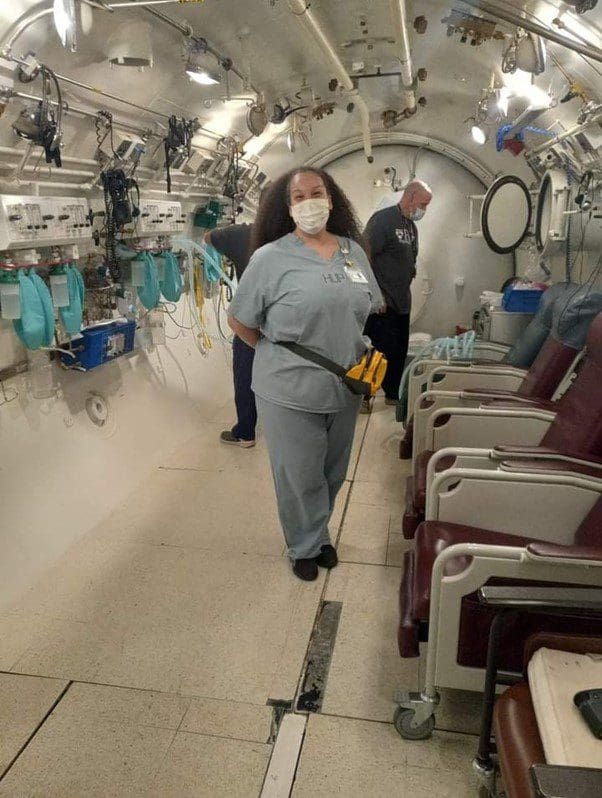

As a new Biomed, with a year in the field, maintaining patient safety, customer satisfaction and providing timely service are my passion. With emphasis of patient safety being of first and foremost importance.
From special projects to corrective maintenance calls and performing preventive maintenance, knowing the service is provided with care is the cornerstone of every day.
Building trust within work relationships with Clinical staff and management, and of course with my Clinical Engineering comrades, I find to be imperative to be successful at all the above.
Knowing people can count on me is humbling.
The number of women working as Biomedical Technicians and Engineers is increasing. How can we help this?
I think wonderful platforms, like the ones provided by The Field Engineer, where women can see other women in various roles in the field, is helping greatly. I remember when I first began studying to earn my degree and I thought to myself, the saying is true:
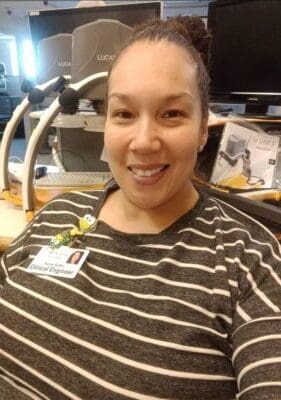

“If you can see her, you can be her!”
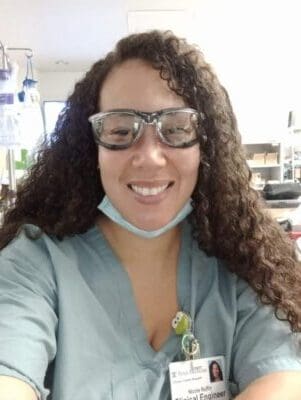

So, I saw women in the field from the very beginning of my journey, as one of my professors was a woman. She then gave a platform by introducing the class to other women in a networking setting. I cannot imagine how my journey would have been had I not seen this representation.
I have tried to do my part by creating a platform to help as well. With the encouragement of a school advisor, who also happens to be a woman, I created a LinkedIn group for the Community College of Philadelphia BMET Alumni.
Further reading
Lorena Leal dos Santos Engineering Intern at GE Healthcare Brazil.
How Rhiannon Thurmond supports her team of engineers when they are in the field.


Responses